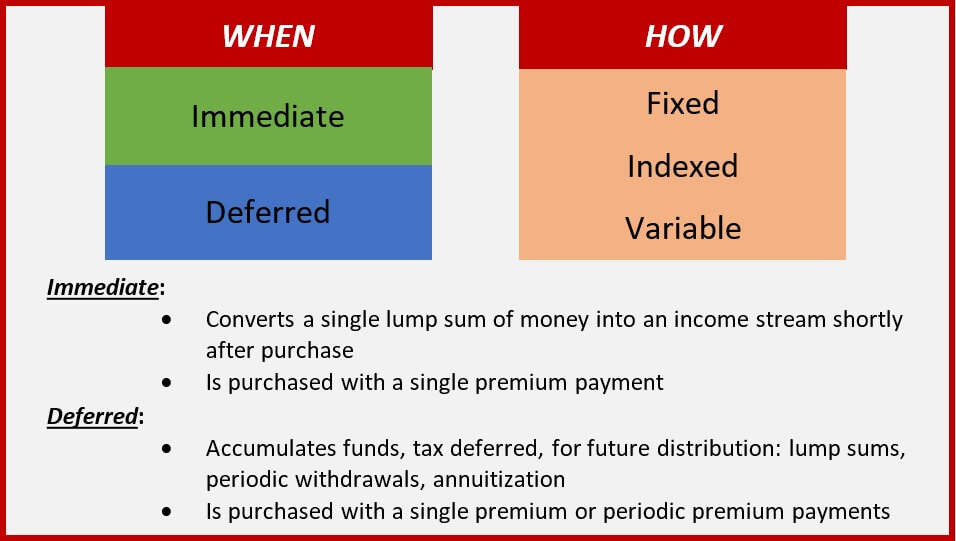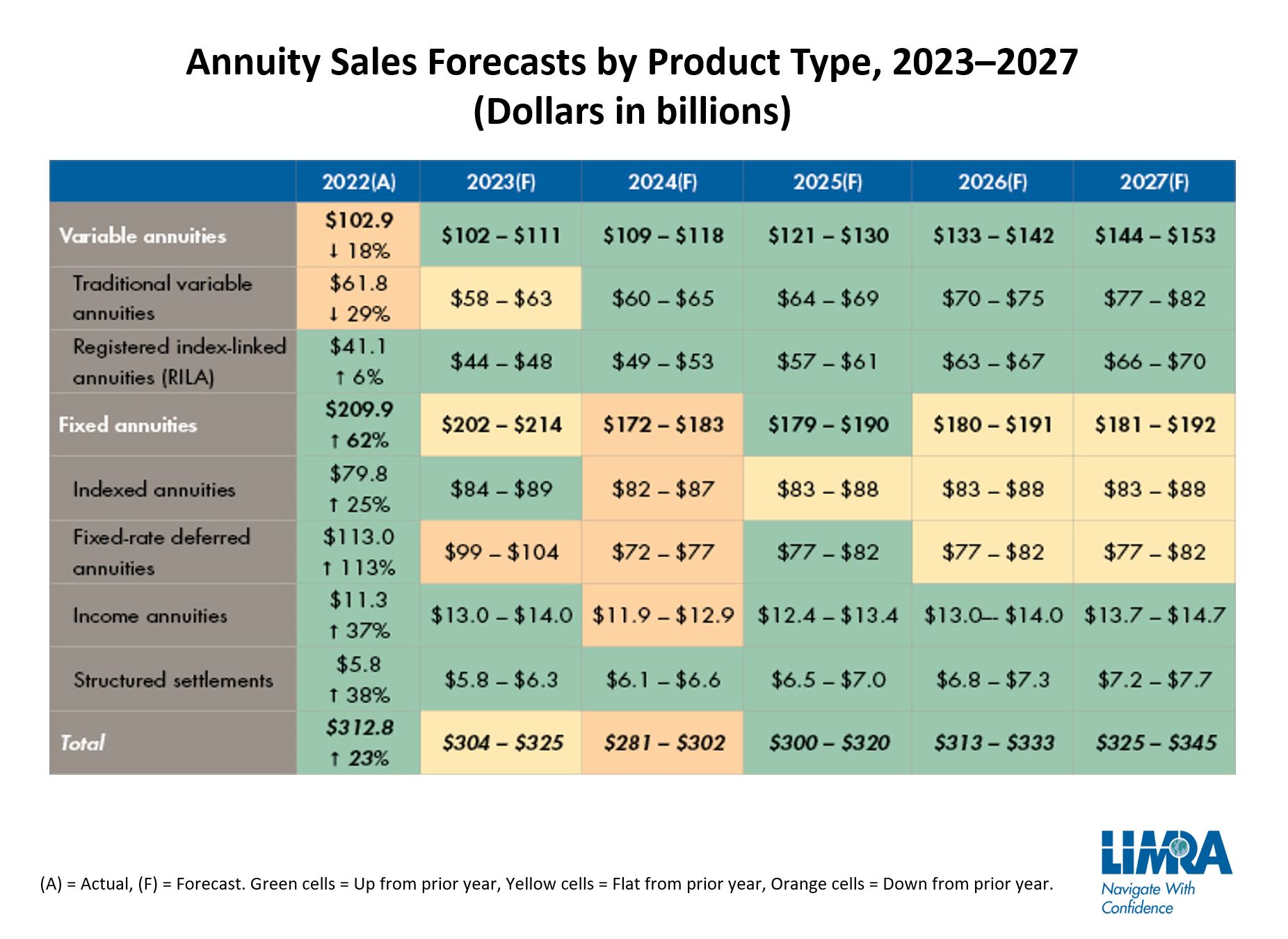All Categories
Featured
Table of Contents
There are three types of annuities: repaired, variable and indexed. With a dealt with annuity, the insurance coverage company ensures both the rate of return (the rate of interest price) and the payout to the capitalist.
With a deferred fixed annuity, the insurance firm agrees to pay you no less than a specified interest rate as your account is growing. With an instant fixed annuityor when you "annuitize" your deferred annuityyou obtain an established fixed amount of cash, usually on a monthly basis (similar to a pension plan).
While a variable annuity has the benefit of tax-deferred development, its annual expenses are most likely to be much greater than the expenses of a common mutual fund. And, unlike a repaired annuity, variable annuities don't give any type of warranty that you'll make a return on your financial investment. Instead, there's a threat that you can actually lose cash.
Understanding Fixed Vs Variable Annuity Pros Cons A Closer Look at How Retirement Planning Works What Is Immediate Fixed Annuity Vs Variable Annuity? Features of Smart Investment Choices Why Fixed Index Annuity Vs Variable Annuity Can Impact Your Future How to Compare Different Investment Plans: Explained in Detail Key Differences Between Fixed Vs Variable Annuity Understanding the Rewards of Fixed Income Annuity Vs Variable Growth Annuity Who Should Consider Indexed Annuity Vs Fixed Annuity? Tips for Choosing What Is A Variable Annuity Vs A Fixed Annuity FAQs About Variable Annuity Vs Fixed Annuity Common Mistakes to Avoid When Choosing a Financial Strategy Financial Planning Simplified: Understanding Choosing Between Fixed Annuity And Variable Annuity A Beginner’s Guide to Smart Investment Decisions A Closer Look at How to Build a Retirement Plan
As a result of the intricacy of variable annuities, they're a leading source of investor issues to FINRA. Before purchasing a variable annuity, carefully checked out the annuity's program, and ask the individual marketing the annuity to clarify all of the item's features, cyclists, expenses and restrictions. You ought to also understand how your broker is being made up, consisting of whether they're obtaining a payment and, if so, how a lot.
Indexed annuities are intricate monetary instruments that have features of both dealt with and variable annuities. Indexed annuities usually offer a minimum surefire rate of interest rate integrated with an interest rate connected to a market index. Lots of indexed annuities are tied to wide, popular indexes like the S&P 500 Index. Yet some usage various other indexes, consisting of those that represent other sections of the marketplace.
Comprehending the features of an indexed annuity can be complicated. There are a number of indexing methods companies use to compute gains and, due to the selection and intricacy of the methods made use of to debt interest, it's challenging to contrast one indexed annuity to another. Indexed annuities are normally categorized as one of the adhering to two types: EIAs offer an ensured minimum rates of interest (commonly at the very least 87.5 percent of the costs paid at 1 to 3 percent interest), as well as an extra rate of interest price linked to the performance of one or more market index.

With variable annuities, you can invest in a range of securities consisting of stock and bond funds. Stock market efficiency figures out the annuity's value and the return you will certainly obtain from the cash you invest.
Comfortable with fluctuations in the stock market and desire your financial investments to keep pace with inflation over a lengthy duration of time. Youthful and intend to prepare monetarily for retired life by enjoying the gains in the stock or bond market over the lengthy term.
As you're building up your retirement financial savings, there are lots of methods to stretch your cash. can be specifically useful financial savings devices because they assure an income quantity for either a set duration of time or for the remainder of your life. Dealt with and variable annuities are two choices that offer tax-deferred growth on your contributionsthough they do it in different ways.
Highlighting the Key Features of Long-Term Investments A Comprehensive Guide to Investment Choices Defining Variable Annuity Vs Fixed Annuity Benefits of Choosing the Right Financial Plan Why Fixed Indexed Annuity Vs Market-variable Annuity Matters for Retirement Planning How to Compare Different Investment Plans: Simplified Key Differences Between Fixed Index Annuity Vs Variable Annuities Understanding the Risks of Long-Term Investments Who Should Consider Strategic Financial Planning? Tips for Choosing Fixed Income Annuity Vs Variable Growth Annuity FAQs About Planning Your Financial Future Common Mistakes to Avoid When Planning Your Retirement Financial Planning Simplified: Understanding Annuity Fixed Vs Variable A Beginner’s Guide to Smart Investment Decisions A Closer Look at How to Build a Retirement Plan
variable annuity or both as you plot out your retired life income plan. An offers a surefire rates of interest. It's taken into consideration a traditional item, using a small revenues that are not tied to market performance. Your contract value will certainly enhance as a result of the accrual of assured rate of interest profits, implying it will not lose value if the market experiences losses.
An includes bought the stock market. Your variable annuity's investment performance will certainly influence the size of your nest egg. It might assure you'll obtain a series of payouts that begin when you retire and can last the remainder of your life, supplied you annuitize (begin taking payments). When you begin taking annuity settlements, they will rely on the annuity value at that time.
Market losses likely will lead to smaller payouts. Any type of rate of interest or various other gains in either kind of agreement are sheltered from current-year taxes; your tax obligation responsibility will certainly come when withdrawals start. Allow's consider the core attributes of these annuities so you can decide just how one or both may fit with your general retirement technique.

A set annuity's worth will not decline as a result of market lossesit's consistent and stable. On the various other hand, variable annuity values will fluctuate with the efficiency of the subaccounts you choose as the marketplaces fluctuate. Revenues on your dealt with annuity will highly depend upon its contracted price when acquired.
On the other hand, payout on a fixed annuity bought when rate of interest are low are most likely to pay out revenues at a reduced price. If the rate of interest is guaranteed for the size of the agreement, profits will remain continuous despite the markets or rate activity. A set rate does not indicate that dealt with annuities are safe.
While you can't come down on a fixed price with a variable annuity, you can choose to purchase conservative or aggressive funds tailored to your threat level. More traditional investment choices, such as temporary mutual fund, can assist decrease volatility in your account. Because dealt with annuities supply an established rate, reliant upon existing rate of interest prices, they don't use that very same flexibility.
Understanding Financial Strategies Everything You Need to Know About Variable Annuity Vs Fixed Annuity What Is Fixed Income Annuity Vs Variable Annuity? Benefits of Fixed Interest Annuity Vs Variable Investment Annuity Why Variable Annuity Vs Fixed Annuity Is Worth Considering How to Compare Different Investment Plans: A Complete Overview Key Differences Between Different Financial Strategies Understanding the Risks of Long-Term Investments Who Should Consider Strategic Financial Planning? Tips for Choosing Annuities Variable Vs Fixed FAQs About Planning Your Financial Future Common Mistakes to Avoid When Planning Your Retirement Financial Planning Simplified: Understanding Your Options A Beginner’s Guide to Fixed Vs Variable Annuity Pros And Cons A Closer Look at How to Build a Retirement Plan

Of the its guaranteed growth from accrued rate of interest repayments sticks out. Fixed rates of interest supply modest growth for their guaranteed profits. You potentially might earn extra lengthy term by taking extra risk with a variable annuity, however you might also lose money. While fixed annuity contracts avoid market risk, their trade-off is less development potential.
Spending your variable annuity in equity funds will certainly offer more prospective for gains. The costs associated with variable annuities may be greater than for other annuities.
The insurance firm might enforce surrender charges, and the Internal revenue service might levy an early withdrawal tax fine. They begin at a specific percentage and after that decrease over time.
Annuity profits go through a 10% early withdrawal tax obligation charge if taken before you get to age 59 unless an exemption uses. This is enforced by the IRS and puts on all annuities. Both taken care of and variable annuities supply options for annuitizing your equilibrium and transforming it right into a guaranteed stream of lifetime income.
Understanding Variable Annuity Vs Fixed Indexed Annuity A Closer Look at How Retirement Planning Works Breaking Down the Basics of Investment Plans Pros and Cons of Various Financial Options Why Retirement Income Fixed Vs Variable Annuity Matters for Retirement Planning Fixed Interest Annuity Vs Variable Investment Annuity: A Complete Overview Key Differences Between Retirement Income Fixed Vs Variable Annuity Understanding the Risks of Long-Term Investments Who Should Consider Strategic Financial Planning? Tips for Choosing the Best Investment Strategy FAQs About Planning Your Financial Future Common Mistakes to Avoid When Planning Your Retirement Financial Planning Simplified: Understanding Your Options A Beginner’s Guide to Fixed Annuity Or Variable Annuity A Closer Look at Retirement Income Fixed Vs Variable Annuity
You might decide to make use of both taken care of and variable annuities. Yet if you're choosing one over the other, the distinctions issue: A may be a much better alternative than a variable annuity if you have an extra conventional threat tolerance and you look for foreseeable rate of interest and principal protection. A may be a far better option if you have a higher threat resistance and desire the potential for long-lasting market-based development.
Annuities are agreements sold by insurance policy business that assure the customer a future payout in normal installments, typically month-to-month and commonly for life. There are different sorts of annuities that are designed to offer different purposes. Returns can be repaired or variable, and payments can be prompt or deferred. A set annuity guarantees repayment of a collection amount for the term of the agreement.
A variable annuity fluctuates based on the returns on the mutual funds it is spent in. A prompt annuity begins paying out as quickly as the buyer makes a lump-sum settlement to the insurance company.
Annuities' returns can be either fixed or variable. With a fixed annuity, the insurance policy company assures the buyer a particular repayment at some future day.
Table of Contents
Latest Posts
Understanding Financial Strategies A Comprehensive Guide to Fixed Income Annuity Vs Variable Annuity Defining the Right Financial Strategy Benefits of Choosing the Right Financial Plan Why Choosing th
Understanding Tax Benefits Of Fixed Vs Variable Annuities A Closer Look at Fixed Annuity Or Variable Annuity What Is Annuities Fixed Vs Variable? Pros and Cons of Variable Annuities Vs Fixed Annuities
Analyzing Strategic Retirement Planning Everything You Need to Know About Financial Strategies Defining What Is A Variable Annuity Vs A Fixed Annuity Pros and Cons of Various Financial Options Why Cho
More
Latest Posts